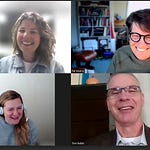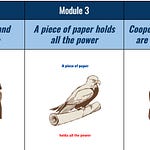Have you ever had a conversation with your colleagues that got you so excited about what you do? It was so much fun to talk with Olivia and Lauren in this episode about googling and academic integrity. It’s a hot topic! AND, I think a few great ideas about how we can take this much taboo topic - and make it an opportunity to think about how we can consider our role in creating opportunities to discourage indiscriminate googling.
While a virtual program may lend itself to more scrutiny in thinking about academic integrity, I am pretty sure this conversation will get you and your colleagues thinking about what you assess (test) and why, regardless of the environment you teach or lead in.
Chime in here or send us an email to keep the conversation going!
pmulroy@worldoflearninginstitute.com, orgrugan@iu08.org, lmcminn@iu08.org
Here are a few key takeaways from this thought provoking conversation:
Do you remember that sinking feeling when you get an assignment that you know is not work your student could have produced? Olivia has a great story about a Kindergarten learner that really makes you think about the why.
There are so many ways to think about why students would choose to google or cheat on an assignment.
We make assumptions about the capability of the student (our feelings about the student can play into this).
What are we incentivizing by the task we are giving the students?
Grading - if we are going to grade - should be reasonable for the level of the specific skill or concept we are expecting students to know. (Olivia shares her perfect assignment at the end of the pod).
Can Google be a tool that can be used well? Can we teach students to be better consumers of information? Is it ok to use a translator or dictionary - folks do it when they travel? More questions than answers.
Linguistic breakdown - refers to the moments when a learner's language. is “no longer adequate to handle the communicative challenges presented” (ACTFL. OPI TTM, 1999), is a lot like frustrational reading levels in that the skill level for a topic and/or cannot meet criteria for instructional levels of accuracy and rate. Is there a similar concept for other subject or content areas?
Stay curious! Maybe the assignment was too hard. Maybe it's the old ‘if you give a mouse a cookie’, they get one word they didn’t know, and then another. Something broke down for the learner where they felt like there was something they didn’t understand.
What will hold up in the workforce for our students?? How can we make assignments more relevant?
Join the conversation HERE.
Let us know if you would like to be a guest on our Podcast - We Do This Everyday! We love to have spirited conversations that make the student and teacher experience fun, authentic, relevant, and engaging!
pmulroy@worldoflearninginstitute.com, orgrugan@iu08.org, lmcminn@iu08.org











